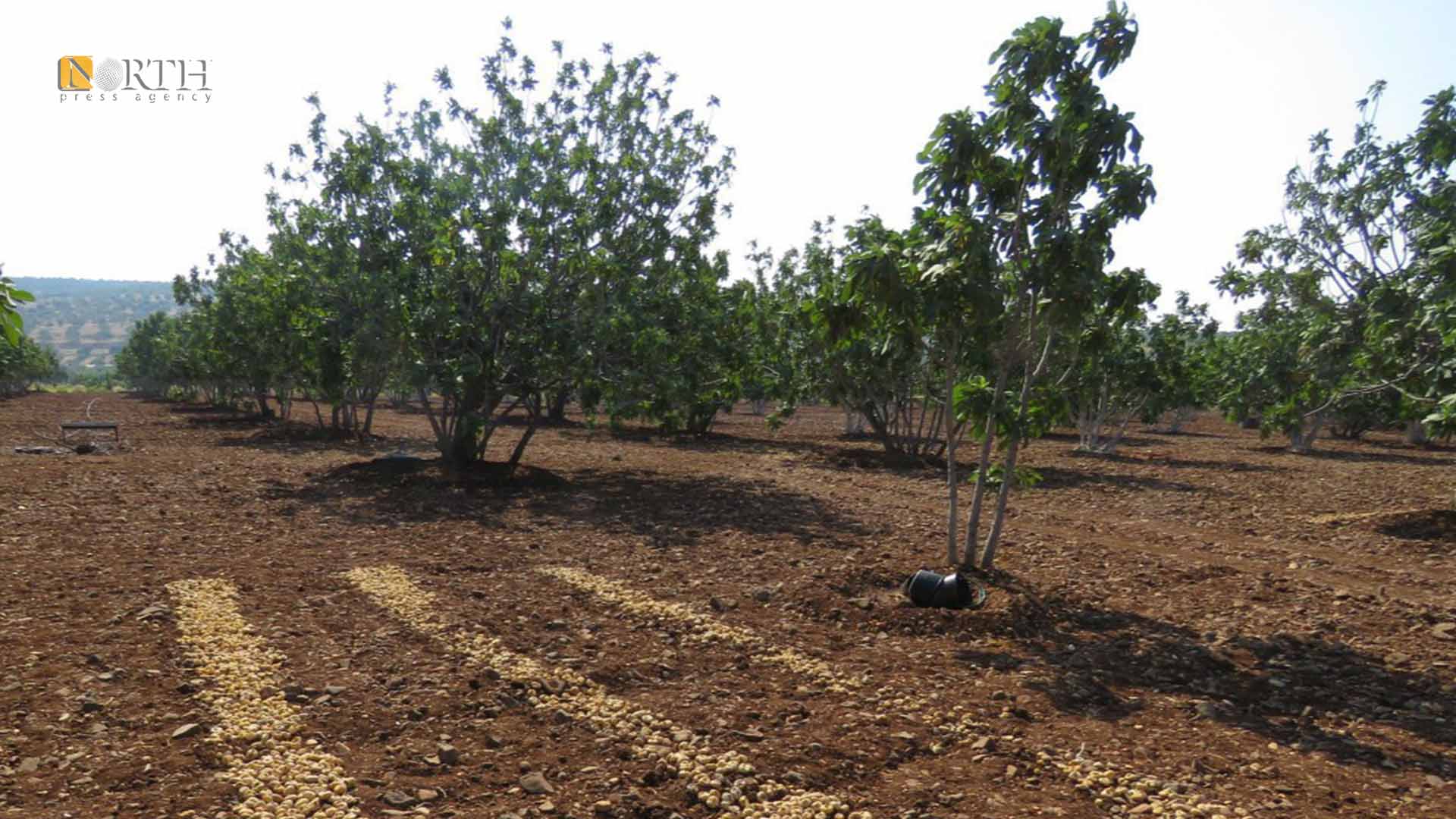IDLIB, Syria (North Press) – Salih al-Sa’ed, a farmer from the Zawiya Mountain region to the south of Idlib, northwest Syria, risks going to his land three kilometers from the Syrian government forces’ checkpoints to harvest figs, despite his fears. The region has recently been witnessing military escalation between Turkish-backed armed groups and the government forces.
Many residents of the villages and towns of Zawiya Mountain rely on harvesting figs at this time of the year, as it is a good source of income amid the difficult situation they are witnessing.
Residents of the government-held areas are suffering from deteriorating living and economic conditions in light of the lack of job opportunities and low wages.
Difficulties
On Wednesday, many villages and towns of Zawiya Mountain were subjected to intense mutual bombardment between government forces and the armed factions in Idlib.
“The fig crop needs constant care, which is impossible in a region subjected to dozens of shells on a daily basis. This affected the quality of the crop and the quantity of its production, which has notably decreased this year due to the limited care,” al-Sa’ed told North Press.
Al-Sa’ed explained that he has been subjected to direct targeting several times during the past days while he was harvesting with his children. In addition, the drones continue to fly over the region, targeting anything that moves.
Al-Sa’ed risks his life and his children’s lives by going to the land, as the fig crop is his main source of income.
For the second year in a row, farmer Jihad al-Hallaq has failed to harvest his fig crop, as his land is located in the area separating the armed factions from government forces near al-Bara town, south of Idlib.
Al-Hallaq pointed out the losses he incurred as he was deprived of harvesting his crop.
“The fig harvest is one of the most important fruit harvests for the residents due to its good prices. In the past, part of the production was dried and sold to merchants who, in turn, exported it to neighboring countries and the Gulf states.”
The price of one kilogram of dried figs reaches more than five dollars, but it requires great care and effort, which is something that has become difficult today due to the security situation, according to farmers.
Farmers say that the fig crop this year was significantly less productive than the previous ones, due to the failure of the farmers to take care of the crops properly because they could not reach their lands most of the time.
Hayat Tahrir al-Sham (HTS) issued a statement earlier this week in which it warned the farmers of Zawiya Mountain against approaching agricultural lands near areas controlled by the government forces without coordinating with those assigned by it to administer the area.
HTS has divided the region into three areas. The first extends from the south of the village of Kafr Aweed to the villages of Sufuhun and al-Fatira, the second includes the entire line adjacent to the town of Kansafra, and the third includes the entire line adjacent to the town of al-Bara and the village of Deir Sunbul to the east.
Between mines and shelling
The living and economic conditions forced Abdurrahman al-Saed to leave the IDP camps in the northern countryside of Idlib and return to his house in Kansafra town to work in harvesting figs in dangerous areas close to the points of the government forces’ control to make a living.
Al-Saed and seven companions go after midnight to the town of al-Fatira, adjacent to the areas controlled by the government forces, from which they go on foot to the fig orchards to start picking them. The work continues from midnight to sunrise, before the bombing begins.
The wages of workers in those areas reach 10 Turkish liras (1.19 USD) per hour.
Al-Saed works for four or five hours a day and receives between 40 and 50 Turkish lira (4-5 USD).
“It is a good amount compared to what I used to earn working in the camps, where I used to be paid about five Turkish lira per hour at best,” he said.
He pointed out that their work at night is not without risk. “We may survive the bombing, but the place is full of landmines and unexploded ordnance, and they pose great threats to our lives.”
On Thursday, a child from the town of al-Bara was killed by a landmine explosion while he was picking figs in the vicinity of the town. Hours before, three civilians were wounded in a similar explosion in the vicinity of the same town and were transferred to medical points near the area.
Al-Saed added that more than 80% of the land in the village of al-Fatira is inaccessible due to its proximity to areas controlled by government forces and the existence of large number of mines and remnants of war there.

